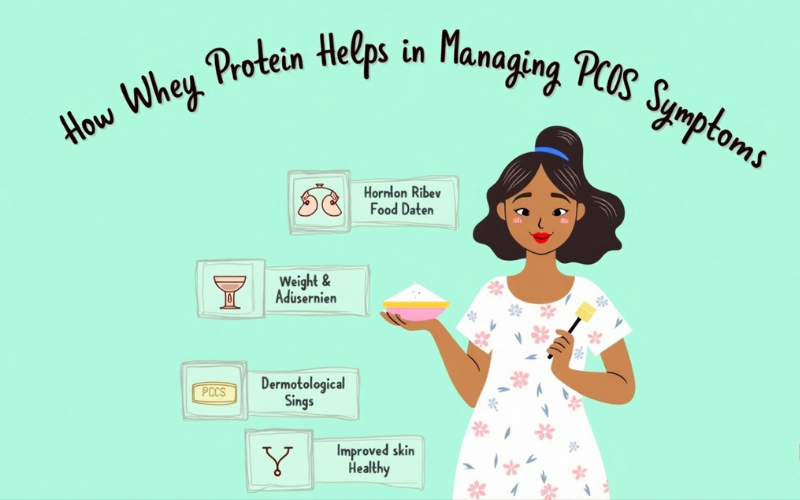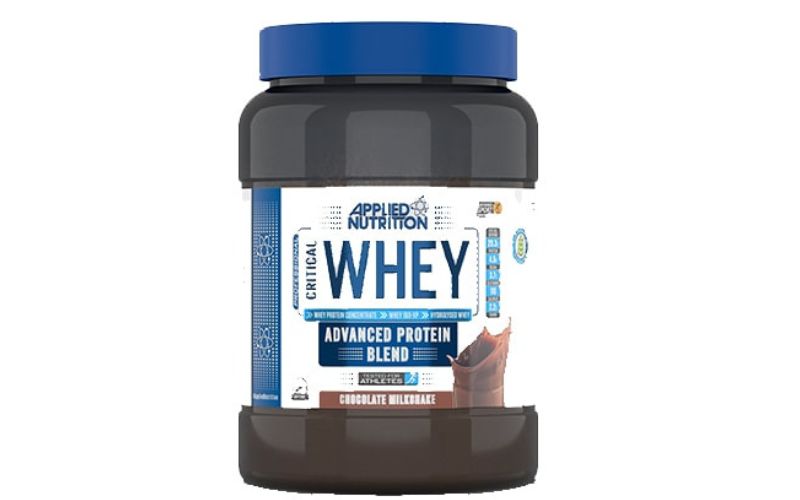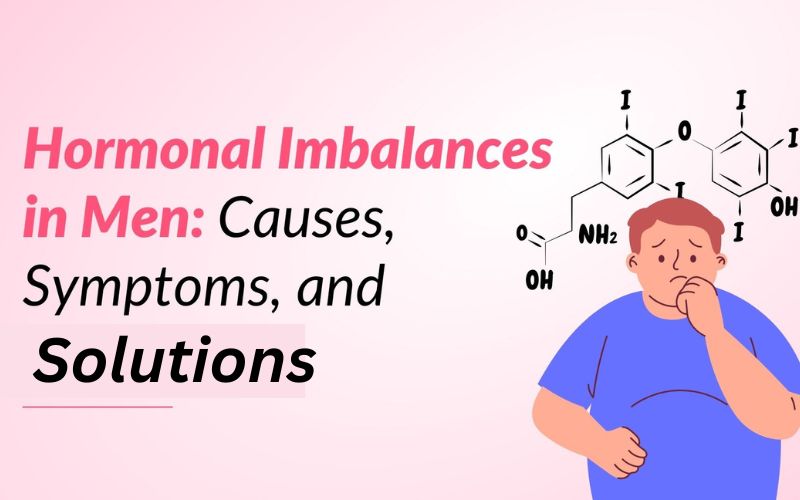Table of Contents
Introduction:
Polycystic Ovary Syndrome (PCOS) is a hormonal condition that affects 1 in 10 women of reproductive age globally. Managing PCOS often involves a multi-faceted approach, including lifestyle, diet, and targeted supplementation. Among various dietary interventions, whey protein has gained popularity—not just among fitness enthusiasts but also among women with PCOS seeking better metabolic and hormonal balance.
This article explores how whey protein helps in managing PCOS symptoms, backed by clinical research and expert insights.
What Is PCOS? Understanding the Hormonal Imbalance
PCOS is characterized by hormonal disturbances such as elevated androgens (male hormones), irregular menstrual cycles, insulin resistance, and the presence of ovarian cysts. Symptoms can vary but often include:
- Weight gain or difficulty losing weight
- Irregular periods or amenorrhea
- Excess facial/body hair (hirsutism)
- Acne and oily skin
- Fatigue and mood swings
- Fertility issues
Insulin resistance plays a central role in the development and progression of PCOS, making nutritional management essential.
Looking to balance your hormones and boost metabolism naturally? Add high-quality whey protein to your PCOS routine and feel the difference—consult your dietitian today!
Why Nutrition Matters in PCOS Management
Proper nutrition helps address:
- Insulin sensitivity
- Chronic inflammation
- Weight control
- Hormonal regulation
Diets high in refined carbs and sugars can worsen PCOS symptoms, while high-protein, low-GI diets can support better metabolic outcomes. Whey protein, a complete protein with rapid absorption and hormonal benefits, is increasingly being used in PCOS-friendly diets.
What Is Whey Protein? Nutritional Benefits for Women
Whey protein is derived from milk during cheese production and contains all essential amino acids. It’s particularly rich in leucine, which promotes muscle synthesis and metabolic activity.
Nutritional benefits of whey protein include:
- High-quality, easily digestible protein
- Low carbohydrate and fat content (especially in isolates)
- Bioactive peptides that support immune and metabolic functions
- Appetite-regulating effects due to impact on ghrelin, GLP-1, and PYY hormones
Whey protein is available in:
- Whey concentrate (contains more lactose and carbs)
- Whey isolate (more purified and ideal for PCOS)
- Whey hydrolysate (partially broken down for faster absorption)
How Whey Protein Helps with PCOS Symptoms
Insulin Resistance and Blood Sugar Control
Many women with PCOS exhibit insulin resistance, leading to elevated insulin levels, which further disrupt hormonal balance. Whey protein helps:
- Increase insulin sensitivity
- Stimulate insulinotropic hormones
- Reduce postprandial glucose spikes when consumed before or with meals
A study published in The American Journal of Clinical Nutrition (2019) found that pre-meal whey protein supplementation improved insulin response and glucose control in insulin-resistant individuals.
Supporting Weight Loss and Metabolism
Weight management is a core goal in PCOS treatment. Whey protein supports fat loss while preserving lean muscle mass:
- Increases thermogenesis and resting metabolic rate
- Promotes lean body mass retention during caloric restriction
- Enhances the effect of strength training and resistance workouts
A 2021 study in Nutrition & Metabolism showed that overweight women supplementing with whey protein lost more body fat compared to those consuming other protein sources.
Reducing Inflammation and Oxidative Stress
PCOS is often accompanied by low-grade inflammation, contributing to metabolic and reproductive issues. Whey protein contains:
- Cysteine, a precursor for glutathione, the body’s master antioxidant
- Bioactive peptides with anti-inflammatory properties
These components may reduce oxidative stress markers, offering potential relief for systemic inflammation seen in PCOS.
Regulating Appetite and Cravings
Hormonal imbalances in PCOS can lead to frequent cravings and poor satiety regulation. Whey protein has been shown to:
- Suppress ghrelin (the hunger hormone)
- Increase satiety-inducing hormones like GLP-1 and PYY
- Reduce sugar cravings and emotional eating
This helps maintain dietary compliance and long-term weight management goals in PCOS.
Scientific Evidence: Studies on Whey Protein and PCOS
Although direct research on whey protein for PCOS is still emerging, related studies offer strong support:
- A 2022 randomized trial in Reproductive Biology and Endocrinology found that high-protein diets with whey supplementation improved menstrual regularity and insulin sensitivity in women with PCOS.
- A 2020 meta-analysis in Journal of Functional Foods confirmed that whey protein intake is associated with reduced insulin resistance and inflammation markers.
Expert insight from Dr. Lara Briden, a naturopathic doctor specializing in women’s health, suggests that high-quality protein—including whey—is essential for hormonal balance and metabolic support in PCOS.
How to Choose the Right Whey Protein for PCOS
Whey Isolate vs Concentrate
For women with PCOS, whey isolate is typically the best choice:
- Lower in lactose and carbohydrates
- Higher protein concentration (~90%)
- Less bloating or digestive discomfort
Whey concentrate, though more economical, may not be ideal for those with lactose intolerance or insulin resistance due to its higher sugar content.
Ingredients to Avoid (Sugars, Hormones, etc.)
When choosing a whey protein:
- Avoid added sugars, artificial sweeteners, and maltodextrin
- Look for grass-fed or hormone-free labels
- Choose brands with third-party testing and transparent sourcing
Expert Tips: Incorporating Whey Protein into a PCOS Diet
Meal Timing, Portion Sizes, and Recipe Ideas
Practical tips:
- Take 20–30g whey protein in the morning or post-workout
- Add to low-GI smoothies with spinach, berries, chia seeds, and unsweetened almond milk
- Use in protein pancakes or Greek yogurt bowls
- Avoid taking with high-GI carbs to reduce insulin spikes
Potential Risks or Considerations
While whey protein is generally safe, consider the following:
- Check for allergies (especially dairy/lactose sensitivity)
- Monitor digestive symptoms; opt for hydrolyzed whey if bloating occurs
- Those with kidney disease or on a high-protein diet should consult their doctor first
Final Thoughts: Should Women with PCOS Use Whey Protein?
So, how does whey protein help in managing PCOS symptoms? The evidence suggests that whey protein can be a powerful nutritional ally—supporting blood sugar balance, weight management, hormonal health, and inflammation control.
For women with PCOS, especially those struggling with insulin resistance or weight loss plateaus, whey protein can enhance the effects of a balanced diet and active lifestyle. However, personalization is key, and it’s best to consult a registered dietitian or gynecologist before starting any new supplement.
FAQ: Whey Protein and PCOS
Q1: Can whey protein regulate menstrual cycles in PCOS?
A: Indirectly, yes. By improving insulin resistance and reducing weight, whey protein may help normalize hormonal levels that control menstrual cycles.
Q2: Is whey protein better than plant-based protein for PCOS?
A: Both can be effective. However, whey protein is often preferred for its rapid absorption, high leucine content, and more complete amino acid profile.
Q3: Can whey protein cause hormonal imbalance?
A: No, quality whey protein does not contain hormones. Choose products that are hormone-free and third-party tested.
Q4: Should whey protein be taken daily for PCOS?
A: It can be safely consumed daily as part of a balanced diet, typically 20–30g per day.
Q5: Does whey protein help reduce facial hair in PCOS?
A: Not directly, but it may help lower insulin levels, which can influence androgen activity—the root cause of hirsutism in PCOS.



























